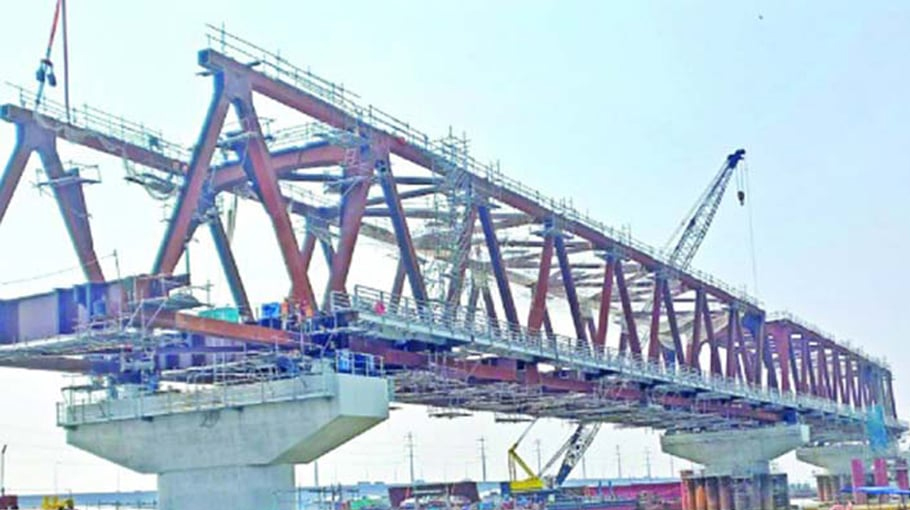Bangabandhu Railway Bridge construction progressing fast

The construction works of the Bangabandhu Sheikh Mujib Railway Bridge over the Jamuna River in Sirajganj are progressing fast as 46 percent work has already been completed.
The 4.8km-long rail bridge is being built 300-metre upstream of the Bangabandhu Bridge aimed at enhancing rail connectivity between the capital and the country's northwestern regions and it is expected to be the largest dedicated rail bridge in the country.
Construction works of 12 out of total 50 pillars were completed and the bridge is becoming visible gradually, said Engineer Al Fattah Muhammad Mashudur Rahman, director of the project.
The bridge is being constructed in 49 spans on 50 pillars that will create scopes of running trains at 100-120 kilometers per hour.
Upon successful implementation of the Taka 16,780-crore project by 2024, the bridge will contribute a lot towards reducing pressure on Bangabandhu Bridge and highway besides reducing the cost of export and import.
He said 46 percent work of one of the country's mega projects was completed.
Railway communication had been introduced between Dhaka and the north and south-western regions of the country first after opening the Bangabandhu Bridge in 1998.
Engineer Rahman said Prime Minister Sheikh Hasina laid the foundation stone of the Bangabandhu Sheikh Mujib Railway Bridge on November 29, 2020.
The dual-gauge, double-track bridge is being constructed on 50 pears as the construction works are going on at two ending points of Sirajganj and Tangail.
A 7.6km-long double-line railway approach embankment, a 30.73km dual-gauge railway track and 16 viaducts will be built under the railway bridge project.
Apart from this, the Bangabandhu Bridge East and West stations and yards will be renovated and remodeled.
Rahman said the Bangabandhu Sheikh Mujib Railway Bridge will be capable of running trains at a speed of 120km per hour on broad gauge line and 100km per hour on meter gauge track compared to the present speed of 10kmph on the Bangabandhu Bridge.
Site Chief Engineer Abdul Khaleque said the dual-gauge double-track railway bridge will save at least 20 minutes commute time as no train will have to wait for line crossing.
Only 38 trains can now travel through the Bangabandhu Bridge on a daily basis. But after the construction of the Bangabandhu Railway Bridge, it will allow as many as 68 trains to operate every day.
This will also give the authorities the option to increase the number of both passenger and freight trains, which is expected to develop the country's rail services and strengthen regional connectivity.
President of Rajshahi Chamber of Commerce and Industries Masudur Rahman said the Bangabandhu Railway Bridge will develop train services.
It will also help boost the economy of the northern region of the country, he said.
The bridge is expected to improve the country's connectivity with such neighboring countries like India, Nepal and Bhutan.




